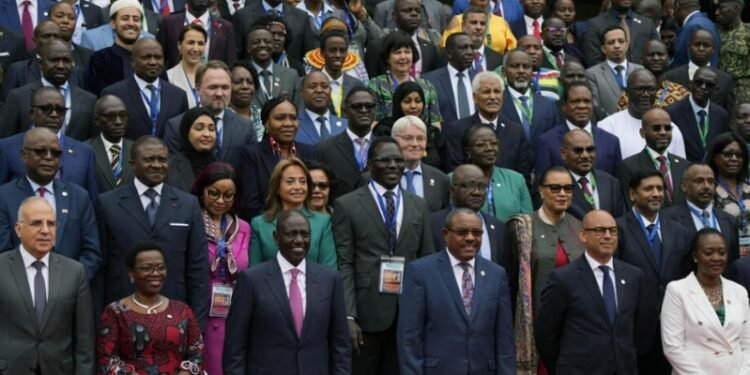The inaugural Africa Climate Summit convened this week in the vibrant city of Nairobi, Kenya. This historic gathering served as a unifying force, bringing together global stakeholders to confront climate change—an issue that holds particularly profound implications for the African continent.
Within this special edition newsletter, we present a wrap-up of the Africa Climate Summit, offering insights into the deliberations, commitments, and pledges that unfolded during the event. With the anticipation of climate crises intensifying in terms of both frequency and severity, the Summit assumed pivotal significance as it provided a unique opportunity to inform, shape, and steer the course of Africa’s climate efforts.
The summit’s agenda spanned a wide spectrum, encompassing extensive discussions on assessments, funding mechanisms, partnerships, commitments, and promises—all in the collective pursuit of combatting climate change.
As Africa Cimate Week continues through the 8th, this newsletter provides a closer look at the outcomes and promises generated at the summit that ran from 4-6 September.

1 African Leaders Advocate Global Carbon Taxes to Finance Climate Change Mitigation
African leaders have proposed new global taxes and reforms to international financial institutions to fund climate change action in a declaration following the Africa Climate Summit in Kenya. The Nairobi Declaration focuses on mobilizing financing to adapt to extreme weather, conserve natural resources, and develop renewable energy in Africa, which currently receives only 12% of the financing it needs to cope with climate change. The declaration calls for major polluters and global financial institutions to commit more resources to help poorer nations and suggests a global carbon taxation regime, including a carbon tax on fossil fuel trade, maritime transport, and aviation. It also advocates for reforms to the multilateral financial system and the development of a new Global Climate Finance Charter by 2025. African countries plan to take these proposals to the U.N. climate conference and COP28 summit for further discussion.
Source: Reuters

2 The Africa Climate Summit: Carbon Credits, Legislation, and African Unity in the Face of Climate Change
At the Africa Climate Summit in Nairobi, William Asiko, from The Rockefeller Foundation, urged Africa to increase carbon credit production to 40% of its potential by 2030. While this was endorsed by some, critics argue for more climate finance in Africa, estimated at up to $1.3 trillion annually by 2025. The Rockefeller Foundation launched the African Carbon Market Initiative (ACMI) to boost carbon credit production, with concerns raised about potential negative impacts. The summit saw significant pledges, including $450 million from the United Arab Emirates. Kenya also passed legislation to enter the global carbon credit market. National Assembly Speaker Moses Wetangula, emphasized African unity in addressing climate change, calling for resource allocation and climate legislation across Africa.
Source: Africa.com

3 Afreximbank’s Climate Commitment and Engagement at the Africa Climate Summit
Afreximbank’s President Prof. Benedict Oramah, led a delegation at the Summit and emphasized the need for action on climate finance. The bank’s commitment focused on climate adaptation, including collaboration with Africa Risk Capacity to protect African economies from climate-induced food security crises. Afreximbank also advocated for a global carbon tax to support climate insurance programs. Additionally, the bank supported African member states in navigating climate challenges by investing in infrastructure for a low-carbon transition and promoting renewable energy. This participation followed Afreximbank’s involvement in COP27 in 2022 and a US$3 billion Country Programme with the Government of Kenya in May 2023, which included climate change adaptation initiatives. President Oramah highlighted Afreximbank’s significant contributions to Africa’s climate resilience and economic growth.
Source: Afreximbank

4 Africa’s Bold Climate Declaration: Demanding Climate Justice and Investment from the World
Heads of state from across Africa have concluded a groundbreaking climate summit in Nairobi, Kenya, with a declaration emphasizing Africa’s potential for clean energy leadership and environmental stewardship. The Nairobi Declaration calls for wealthier nations, responsible for climate change, to invest in Africa rather than relying solely on aid during crises. This lack of financing remains a major issue in global carbon reduction efforts. While some investors pledged approximately $23 billion for projects like solar microgrids and reforestation, it’s unclear how much represents actual commitments. The summit aimed to amplify the argument for climate financing ahead of the United Nations global climate summit in Dubai later in the year. Tensions were evident as African leaders urged a sense of urgency in fulfilling financing pledges, particularly from Western nations. The conference also faced criticism concerning its impact on local economies, with questions raised about the source of energy and economic crises in Kenya. Despite some key absences among African leaders, the request for concessional finance, including loans with favorable terms, could see large contributions from institutions like the World Bank and IMF in the near future. U.S. funding for climate aid is pending congressional approval, with hopes of allocating significant funding for climate-positive investments in lesser-developed countries. Overall, the summit underscores the growing momentum in addressing climate change and the need for substantial financial commitment from wealthier nations.
Source: New York Times

5 AfDB President Dr. Akinwumi Adesina Commends African Youth’s Call for Climate Action Leadership
Hundreds of young people from across Africa have come together to advocate for a more substantial role in shaping climate action policies. At the Africa Youth Climate Assembly in Nairobi, youth leaders, entrepreneurs, and policymakers presented the Africa Youth Climate Assembly Declaration to Kenya’s President William Ruto and African Development Bank Group President Dr. Akinwumi Adesina. The declaration calls for the establishment of a Global Green Bank and a New Global Financial Pact to prioritize youth interests in climate financing, as well as the creation of a UN Youth office in Africa, home to the world’s largest youth population. In response, President Ruto and Dr. Adesina recognized Africa’s youth as a valuable asset and expressed support for their involvement in shaping national and international climate policies. The declaration’s demands will be considered in the Nairobi Declaration, a blueprint for Africa’s green energy transition, as part of the ongoing Africa Climate Summit and Africa Climate Week.
Source: Africa Development Bank

6 John Kerry Warns of Climate Crisis Impact on Africa at AU Summit, Calls for Just Transition
U.S. climate envoy John Kerry addressed the African Union climate summit in Nairobi, emphasizing the severity of climate change as “one of the most dangerous issues in all of human history.” Kerry highlighted the disproportionate impact of climate change on Africa and low-lying nations, citing migration and conflict as consequences. African leaders are pushing for market-based financing mechanisms like carbon credits and debt-for-nature swaps to mobilize much-needed funding. Despite calls for increased climate financing, Africa has received only about 12% of the required funds, partly due to a perception of risk. The summit aims to rebrand Africa as a climate investment destination rather than solely a victim of climate-related challenges.
Source: VOA

7 United Arab Emirates Emerges as Carbon Credits Leader in Africa with $450 Million Pledge at Africa Climate Summit
The United Arab Emirates is solidifying its position as a leader in carbon credits in Africa by committing hundreds of millions of dollars to generate carbon offsets on the continent and buy land from African governments. A coalition of major UAE energy and financial companies announced their intention to purchase $450 million worth of carbon credits from Africa by 2030. While this move generated excitement at the Africa Climate Summit, it also sparked criticism from environmental groups, who argue that carbon credits may divert attention from essential climate and biodiversity actions, such as ending fossil fuel expansion. The African Carbon Markets Initiative (ACMI) is at the forefront of this push, aiming to significantly increase carbon credit generation in Africa with support from UAE-based investors and organizations. Additionally, UAE’s Blue Carbon is partnering with African governments to manage forests and produce carbon credits, a move that has garnered mixed reactions and raised concerns about land ownership and rights. Critics contend that carbon credits can perpetuate pollution and suggest alternative approaches for addressing climate change.
Source: Climate Home News

8 Ugandan Climate Activist Vanessa Nakate Calls for Green Solutions
Activist Vanessa Nakate believes that Africa holds vital solutions for the global climate crisis. The inaugural Africa Climate Summit in Nairobi aims to secure financing to ensure Africa’s prosperity while combating climate change. Despite contributing only 2-3% of global greenhouse gas emissions, Africa bears a disproportionate burden of climate change impacts. The summit brings together leaders from 54 African nations to define a shared vision of green development. President William Ruto emphasizes the need for international support to unblock financing and ease debt burdens on African countries. Achieving climate goals requires an eight-fold increase in global energy investment. Nakate and other activists call for solutions led by and for African people to address the climate crisis and challenge the summit’s focus on rich-nation interests.
Source: Africa News
9 Africa Climate Summit Concludes with a Strong Emphasis on Climate Compensation
Source: KTN News Kenya

10 UN Secretary-General Urges Global Action on Climate and Financial Justice at Africa Climate Summit
In his press encounter at the Africa Climate Summit, the UN Secretary-General expressed gratitude to Kenya for its warm welcome and highlighted the immense potential in African countries. He emphasized the urgent need to address climate change, noting Africa’s disproportionate suffering despite low emissions. The Secretary-General called for enhanced global climate action, support for Africa’s transition to renewable energy, and reforming the unfair global financial system. He proposed the creation of an African Renewable Energy Alliance and advocated for debt relief, re-capitalization of Multilateral Development Banks, and a yearly SDG Stimulus. Additionally, he called for reforms in global governance structures to ensure African representation and rectify historical injustices. The Secretary-General pledged to collaborate with African leaders and organizations to achieve a peaceful, prosperous, and sustainable future for the continent.
Source: United Nations










